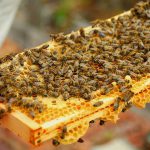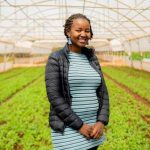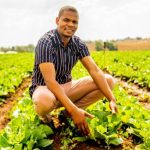
Rinae Tshikangavhadzi
TC Woman in Action Farming (Pty) Ltd, Tarlton, Gauteng
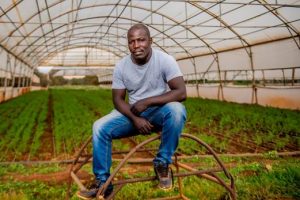
Rinae Tshikangavhadzi started TC Woman in action farming in 2009, an urban farm where he grows vegetables such as beans, spinach, kale, cucumber, cauliflower, and broccoli. His farm is 17 hectares in size.
Rinae prefers to plant in summer and harvest during winter. “We also do crop rotation where we rotate the green beans and spinach.”
Rinae currently employs eight employees.
“I was lucky enough to get a piece of land and decided to start farming.” Rinae feels that he contributes to food security. “What I love most about farming is that it allows me to produce good food for others to consume.”
People often assume that Rinae is very wealthy. “People think that I am rich and others feel that I chose the wrong career.”
Rinae is part of the 2019 SAB Urban Agriculture Programme, and hopes to become a commercial farmer.
Now in its second year, the Urban Agriculture Programme invests in high potential farming businesses, by integrating technology solutions that will grow the businesses and create lasting employment.
The 15-month business development programme provides participants with technical and operational training, hydroponic infrastructure investment, industry-based mentorship, as well as market access.
Vutlhari Chauke
VT Harvest (Pty) Ltd, Tarlton, Gauteng
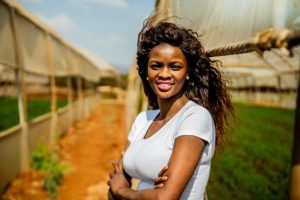
Vutlhari Chauke established VT Harvest in 2017, an urban farm where she grows herbs such as baby fennel, coriander, curly parsley, Italian parsley, rocket and wild rocket, and kohlrabi, a German turnip.
Vutlhari’s farm has 13 greenhouse tunnels equipped with dripper and overhead sprinkler irrigation systems. “We plant between 10,000 and 15,000 seedlings per tunnel depending on the type of crop.”
Vutlhari’s herb production cycle is from four to six weeks in summer; and six to eight weeks in winter. “Our production plan is prepared six months in advance to effectively factor crop rotation and seedling preparation. The production team is responsible for soil preparation, planting, weeding, irrigation, and harvesting.”
VT Harvest checks for pests twice a week and sprays crop protection chemicals when required on Fridays. They pick fresh herbs by hand on a daily basis and select only the top-quality produce for delivery to customers from Mondays to Fridays.
Vutlhari currently has two permanent employees and eight part-timers.
She initially became a farmer to make money, but later realised that agriculture created employment and contributed to food security. “My goal is to become a black female farmer success story, where my brand is respected in the industry. I would like to leave a legacy for my children.”
“Being able to consistently nurture seedlings, witness them grow into nutritious crisp produce, which end up on the shelves of retail stores makes me proud to be a farmer, because we are enhances culinary experiences of our communities.”
“I left a Sandton corporate job at one of the Top 10 JSE Listed companies for farming. I traded high heels for gumboots and this was considered a regression, almost a downgrade in my career. Some people told me that I had wasted my investment in my MBA studies, however I vehemently disagree, because farming has allowed me to test some of the theories in a real-life context and use the financial and stakeholder management modules to optimally run my operations and grow the business.”
Vutlhari is part of the 2019 SAB Urban Agriculture Programme and hopes the programme will add value to her business through infrastructure assistance to expand her operations so that she can enter the agro-processing and exports spaces.
Now in its second year, the Urban Agriculture Programme invests in high potential farming businesses, by integrating technology solutions that will grow the businesses and create lasting employment.
The 15-month business development programme provides participants with technical and operational training, hydroponic infrastructure investment, industry-based mentorship, as well as market access.
Katlego Meso
Katlego Malesa Farming T/A and Katlego Meso Farming Industries (Pty) Ltd, Tarlton, Gauteng
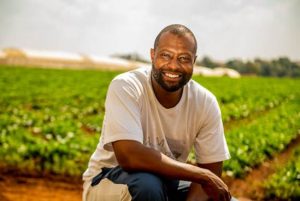
Katlego Meso started Katlego Malesa Farming in 2009, where he grows red cabbages, celery, peppers, and broccoli. The farm is 24 hectares in size, with 18 hectares being arable land.
“We plant 20,000 seedlings every two weeks until the targeting area of land is covered. Crop care is important since we farm on an open field. We supply produce to the Johannesburg Market.”
Katlego currently has eight employees, four of whom are permanent.
Katlego became a farmer because he enjoys feeling like he has accomplished a noble deed. “I love the freedom of doing what I love. Farming can create jobs and alleviate poverty.”
Katlego is part of the 2019 SAB Urban Agriculture Programme, and hopes to gain better insight of the business, farming skills and market access.
Now in its second year, the Urban Agriculture Programme invests in high potential farming businesses, by integrating technology solutions that will grow the businesses and create lasting employment and sustainable businesses.
The 15-month Business Development Programme provides participants with technical and operational training, hydroponic infrastructure investment, industry-based mentorship, as well as market access.
With thanks to SAB KickStart and Corporate Image for materials and photographs.
Urban agriculture is part of “The Urban Question” page on Agribook.Digital.


